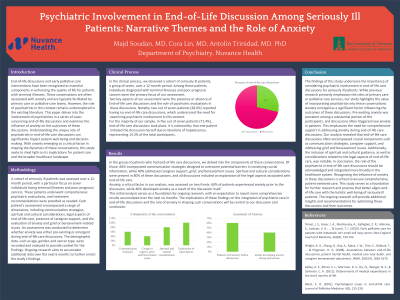Psycho-Oncology and Palliative Care
Session: Poster Session
(127) Psychiatric Involvement in End-of-Life Discussion Among Seriously Ill Patients: Narrative Themes and the Role of Anxiety

Trainee Involvement: Yes

Majd Soudan, MD
Resident Physician
Nuvance Health
Stamford, Connecticut, United States- CL
Cora Lin, MD
Resident Physician
Nuvance Health
Norwalk, Connecticut, United States - AT
Antolin Trinidad, MD PhD
Medical Department Chief/Director
Nuvance Health
Norwalk, Connecticut, United States
Presenting Author(s)
Co-Author(s)
Introduction: Numerous studies have demonstrated that patients with terminal illnesses and poor-prognosis cancers can experience an enhanced quality of life when palliative care is initiated early on and when discussions about end-of-life occur. End of Life conversations remain difficult and anxiety provoking for patients resulting in failure of addressing the key elements of such discussions. In the extant literature, it is often the primary service or the palliative care service that is solely involved in such a discussion. The purpose of this paper is to discuss psychiatric involvement in a series of cases involving end-of-life discussion. We also looked at anxiety as an influential emergent effect that influences the outcome of the discussion.
Patients and methods: A cohort series of seriously ill patients seen in psychiatric evaluation during a 12-month period of whom seven patients, with terminal illnesses and poor prognosis cancers, were interviewed and assessed for psychiatric evaluation -- as such, they are given a psychiatric evaluation and treatment recommendation if needed. In the same evaluation or series of evaluations, patients were assessed on whether end-of-life care discussion by the treatment team had occurred and in what period. Included in the psychiatric assessment are communication strategies, spiritual and cultural considerations, legal considerations, the presence of caregiver support, and anxiety and/or grief and bereavement issues. In this case series, we assessed whether anxiety either pre-existing from or emergent to the discussion is present.
Results: Two of seven patients so far reported having no conversations regarding end-of-life care (28.6%) and five of seven patients (71.4%) reported having an end-of-life care discussion during the initial assessment. Among these five patients, one patient initiated the discussion herself because of ideations of hopelessness accounting for 14.3% of the total participants. Out of the five patients who had end-of-life care discussions, only three (60%) included communication strategies to overcome communication barriers, while two (40%) discussed caregiver support, grief, and bereavement. Eighty percent of participants received spiritual and cultural guidance, and all participants had a conversation about the legal aspects of end-of-life care. 60% of patients had anxiety before the discussion and 40% percent had anxiety because of the discussion. We expect to report more results accumulated in the next 6 months.
Conclusion: Although end-of-life care has been extensively studied in different populations and settings, the role of the psychiatrist is seldom explored. In our series, we find that end-of-life discussion can be an important part of the psychiatric assessment, and that anxiety is a relevant factor associated with or emergent from end-of-life discussion.

